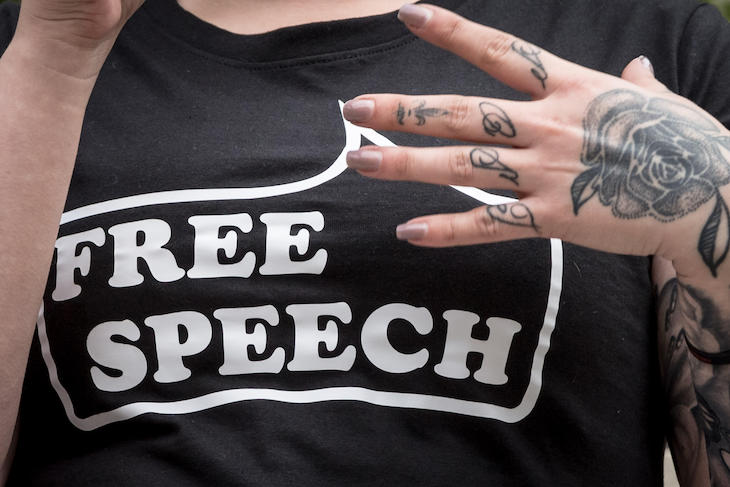If you think Britain’s free speech crisis is bad now, if Ofcom gets its way it could get a whole lot worse. The broadcasting regulator-turned-internet-policeman is currently consulting on proposals to beef up the Online Safety Act. The proposals in its blandly-title ‘Additional Safety Measures‘ document could reduce the internet in Britain to a shadow of its varied, vibrant self.
Ofcom’s proposals are alarming
A big chunk of the 309-page consultation concerns livestreaming. In Ofcom’s world, livestreams are of particular concern because of the ‘risk’ posed by humans interacting with each other in real time. The proposed measures go way beyond protecting children from online predators, encompassing all livestreaming services at ‘medium or high risk’ of ‘harms’ ranging from terrorism to hate. The regulator wants online services to implement reporting systems that would cost an estimated £19,000-£68,000 to implement and up to £17,000 a year to run. On top of that, livestreams could be monitored by paid moderators backed up training, software and even ICT teams.
This is a step short of outlawing certain types of livestreaming, imposing a compliance burden so heavy that over time all but the biggest and most determined would likely throw in the towel. What a loss for the nation! Livestreaming encompasses podcasts, meetings and courses on potentially any subject. For many YouTubers, live broadcasts are a way of generating interest in a related business or rewarding ‘members’. Non-profit services host meetings on specific subjects and bring together groups with shared interests. Livestreams are one of the main ways we come together in 21st century Britain. They’re central to our freedom of association.
It is vanishingly unlikely that such measures would keep anyone ‘safe’. When the Online Safety Act came into force, VPN sales immediately soared, with Proton reporting a 1,800 per cent increase in daily sign-ups. When prohibition strikes, people seek workarounds. Might we see a new era of off-shore podcasting? That raises an interesting question about Ofcom’s jurisdiction. The regulator claims its reach is worldwide, giving it the power to levy fines on services used by Brits regardless of where they are based. The legal challenge by US-based 4chan and Kiwi Farms will be a test of this extraterritorial hubris. Meanwhile, less litigious services may well decide that UK custom is simply not worth having.
Ofcom’s other proposals are equally alarming. Services with more than 700,000 monthly users could have to conduct assessments with a view to introducing software scanning for illegal content at an estimated annual cost of £9,000-£260,000.
Services with recommender systems should design them to flag up potential illegal content at ‘medium or high risk for at least one priority illegal content’ – a measure that could suppress news about current events. The regulator says it considered applying the measure to ‘all priority illegal harms’ but has held off for now. It would come as little surprise if the scope of harms was expanded in future.
This means that a modest service could suddenly become unviable because some content has unexpectedly gone viral or find itself subject to costly compliance obligations following a bureaucratic edict. As we saw from the OSA’s first round of casualties, vague assurances from Ofcom HQ about who they are interested in don’t reassure administrators who want a quiet life curating posts about hamsters.
History teaches that a censorship regime, once in place, increases its reach – and Ofcom is quite open about its aspirations to greater control. Livestreaming might become subject to identity verification, it says, as part of a regulatory approach that must be ‘dynamic’. Meanwhile, an ominous sign about how enforcement could work comes from the BritCard report. Digital ID, say Labour Together, could help deal with ‘harmful online content’.
Ofcom knows its proposals would suppress online life in Britain. ‘There is a risk that some service providers may exit or choose not to enter the market as a result of our proposed measures,’ it writes. They ‘may act as a barrier to growth or disincentive to entry for new services … [and] entrench the market position of larger services through the impact on service providers revenues or business models’.
But in the mind of a body gripped by overbearing parentalism and given almost untrammelled power by Parliament, Harm trumps all: ‘Given the severity of the harm we are seeking to mitigate and the risk of real-time coercion, we consider these wider potential impacts to be proportionate.’ The ‘rights assessments’ which follow each set of proposals give greater insight into the thinking of Britain’s state censor. In many cases, the measures would interfere with the freedom of expression, association and privacy rights, the regulator blithely admits, but the need to avoid harm makes them ‘necessary and proportionate’.
Peering further down the line into the world envisaged by Ofcom, what I see is a digital version of the Eastern Bloc countries before The Wall came down. It’s an impoverished place, characterised by self-imposed information rationing where gatherings of the proletariat are strictly overseen.
We’re at a crossroads. If we don’t understand that safety isn’t everything and remember that openness and communication are essential to a healthy society, online life in Britain is going to become very bleak indeed.







Comments